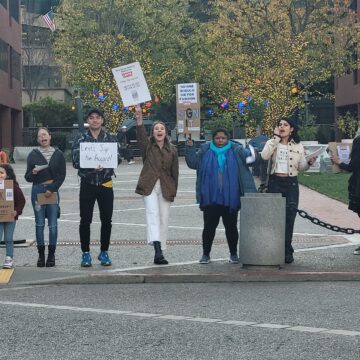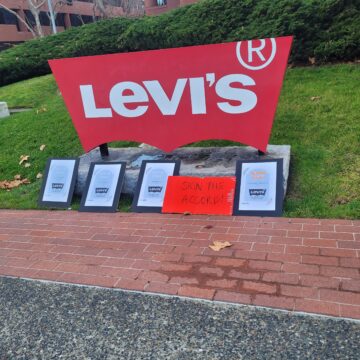- By: Anna Canning
- Tags: Apparel, Bangladesh Accord, Worker-driven Social Responsibility
This week, Levi Strauss & Co., the iconic U.S.-based denim brand, became the 129th signatory of the Pakistan Accord. Finally, after years of global campaigning by workers’ unions and advocates, garment workers in Levi’s Pakistan supply chains will be able to go to work without having to fear for their lives. We welcome Levi’s in making this binding, enforceable commitment to independent monitoring of factory conditions and worker safety.
The Pakistan Accord is the country program of the International Accord on Health and Safety in the Textile and Garment Industry, the legally-binding agreement between brands and unions that originated in Bangladesh. The Pakistan Accord came into effect in 2023. This program brings the principles of Worker-driven Social Responsibility to life through worker trainings, a complaint mechanism, an independent investigation and inspection body, and strict, timebound remediation of violations. Since 2023, hundreds of thousands of workers in Pakistan’s garment industry have benefited from protections under the Accord. Levi’s commitment is welcome, and signals the beginning of a new era in which more U.S. brands need to sign binding agreements such as the Accord.
Brands Delays Have Tragic Costs for Workers
Levi’s has been the target of intense campaigning by garment workers unions in Bangladesh and Pakistan, as well as labor rights advocates around the globe for years. The WSR Network has played a leading role in U.S.-based campaigning, bringing union leaders and activists to the Levi’s headquarters with demands that they sign the Accord. In addition to the WSR Network, the U.S. campaign on Levi’s has been spearheaded by the Clean Clothes Campaign, Eko, Remake, and Workers United.
Just days before Levi’s announced they would sign the Pakistan Accord, a worker was killed and four more were injured in an explosion at Combined Fabrics, a Levi’s supplier in Pakistan. This tragic incident highlights the real human costs of brands dragging their feet and continuing to rely on a patchwork of voluntary initiatives. Reports from the Clean Clothes Campaign have exposed how Levi’s voluntary corporate social responsibility schemes have failed to protect workers. In 2022, four workers died in a Pakistan factory that supplied Levi’s (as well as other U.S. brands who have to-date failed to sign the Accord, including Kontoor Brands (owners of Lee and Wrangler)).
Binding Agreements like the Pakistan Accord are Now Global Norm
Levi’s signing onto the Pakistan Accord is part of a broader shift: global consensus is growing that binding, enforceable agreements backed by worker education and organizing with independent enforcement mechanisms are the best way to protect people at work. The new Corporate Sustainability Due Diligence Directive (CSDDD) in Europe underscores that corporations are indeed responsible for the consequences of their purchasing practices. Complaints filed against other Accord holdouts under Germany’s Supply Chain Act make clear that binding agreements are now the norm. Last month, Nike investors with $4.4 trillion in assets under management (including one of Nike’s top investors, the Norwegian Sovereign Wealth Fund) brought a resolution calling on Nike to implement Worker-driven Social Responsibility in their supply chains, including signing the Pakistan Accord. As one of the investors wrote, “Nike’s reliance on voluntary corporate social responsibility initiatives, which lack enforceable mechanisms, falls short in comparison.” From policymakers to shareholders, pressure is mounting for brands to sign binding, enforceable agreements and make their commitment to workers’ rights real and enforceable.
U.S. Brands Need to Follow Levi’s Example, Sign the Accord
Unfortunately, far too many U.S.-based companies who source from Pakistan continue to dodge their responsibilities and freeload off brands that have signed the Accord. Kontoor Brands (owners of Wrangler, Lee, Rock & Republic) have come under fire after four workers died in a factory (Gap, who also sourced from that factory, has since signed the Accord). Other U.S. brands such as Target, Urban Outfitters, and TJX (parent company of TJ Maxx, Marshalls, and Home Goods, among others) remain holdouts as well.
Levi’s joining the Accord shows that the tide is turning–it’s high time these brands come to the table and sign binding agreements with the workers in their supply chains.
- Photos from 2022 action at Levi’s headquarters in San Francisco


